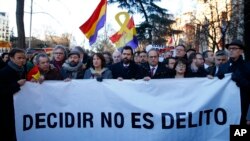Trial began Tuesday in Spain for 12 Catalan separatist politicians and activists charged with rebellion and other crimes stemming from Catalonia's illegal declaration of independence.
The declaration was based on the results of an independence referendum vote held on October 1, 2017. The regional Catalan government held the referendum in defiance of Spain's constitutional court judges, who ruled the vote was illegal.
The trial, in Spain's Supreme Court in Madrid, billed by many as the "trial of the century," is arguably Spain's most significant in four decades of democracy.
Court proceedings began as the fate of Prime Minister Pedro Sanchez's minority government rests with last-minute negotiations with Catalan separatist parties to support his proposed 2019 budget.
Sanchez could be forced to call early elections if separatists vote against his budget plan.
The separatist parties have sought negotiations with Sanchez on self-determination for Catalonia, located in northeastern Spain, but the Spanish government maintains the constitution prohibits it.
The trial got underway in a highly charged political environment amid demonstrations by supporters of the defendants. Pro-independence demonstrators briefly blocked roadways before the trial, which is expected to last three months.
Some observers believe the trial's outcome could establish the course of the secession movement and the tone of national politics for years to come.
Catalonia's former leader, Carles Puigdemont, who is living in self-imposed exile in Belgium, said Tuesday in Berlin the trial is a stress test for Spain's judicial system and its democracy.







